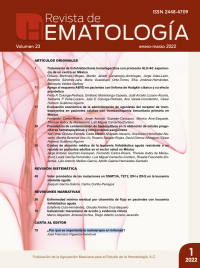Adherence to the ABVD scheme in patients with classical Hodgkin’s lymphoma and its prognostic impact.
Rev Hematol Mex. 2022; 23 (1): 11-16. https://doi.org/10.24245/rev_hematol.v23i1.7459
Perla R Colunga-Pedraza,1 Emiliano Montelongo-Cepeda,2 Judit Arcelia Lozano-Alcorta,1 Samanta P Peña-Lozano,1 Julia E Colunga-Pedraza,1 Ana Varela-Constantino,1 César Homero Gutiérrez-Aguirre1
1 Servicio de Hematología.
2 Facultad de Medicina, Universidad Autónoma de Nuevo León.
Hospital Universitario Dr. José Eleuterio González, Monterrey, Nuevo León, México.
Resumen
OBJETIVO: Conocer el efecto pronóstico del retraso en la administración del esquema ABVD, además de describir los motivos del retraso y los datos demográficos de nuestra población.
MATERIALES Y MÉTODOS: Estudio descriptivo, retrospectivo, sin intervención en el que se incluyeron pacientes con diagnóstico confirmado histológicamente de linfoma de Hodgkin de 2015 a 2019 con tratamiento ABVD en primera línea en nuestro centro. El retraso en la aplicación del esquema ABVD se definió como el diferimiento de más de 48 horas en alguna de las administraciones.
RESULTADOS: Se incluyeron 44 pacientes; 28 femeninas y 16 masculinos con mediana de edad de 29.5 años (límites: 15-73). En total, 20 mostraron retraso y 24 tuvieron buen apego al esquema. La principal causa de retraso fue neutropenia en 9 pacientes. La tasa de respuesta completa, supervivencia global y supervivencia libre de evento no fue significativamente distinta entre los grupos. No hubo diferencia significativa en la supervivencia global (88.7 vs 100%, p = 0.09) o la supervivencia libre de evento (58.8 vs 77.8%, p = 0.26) a tres años en pacientes que tuvieron retraso vs aquéllos sin retraso.
CONCLUSIONES: No se encontró efecto en la supervivencia global o supervivencia libre de evento en pacientes con retraso en la administración del esquema ABVD.
PALABRAS CLAVE: Linfoma de Hodgkin; ABVD; neutropenia; pronóstico.
Abstract
OBJECTIVE: To know the reasons for a delay in the administration of the ABVD scheme and its impact on patients’ health in our center.
MATERIALS AND METHODS: A descriptive, retrospective study without intervention including patients with histologically confirmed diagnosis of Hodgkin’s lymphoma from 2015 to 2019 with first-line treatment ABVD in our center. Delay in the administration of ABVD scheme was defined as the deferment of more than 48 hours in any administration.
RESULTS: Forty-four patients were included; 28 females and 16 males with a median age of 29.5 years (15-73). In total, 20 had a delay and 24 had good adherence to the scheme. The main cause of delay was neutropenia in 9 patients. The complete response rate, overall survival, and event-free survival were not significantly different in both groups. In the subgroup of patients with low International Prognosis Score, event-free survival was worse in patients with a delay in their treatment (75% at 4 years vs 33%).
CONCLUSIONS: We did not find any impact on overall survival or event-free survival in patients with deferral of the ABVD scheme.
KEYWORDS: Hodgkin disease; ABVD; Neutropenia; Prognosis.
Recibido: febrero 2022
Aceptado: abril 2022
Este artículo debe citarse como: Colunga-Pedraza PR, Montelongo-Cepeda E, Lozano-Alcorta JA, Peña-Lozano SP, Colunga-Pedraza JE, Varela-Constantino A, Gutiérrez-Aguirre CH. Apego al esquema ABVD en pacientes con linfoma de Hodgkin clásico y su efecto pronóstico. Hematol Méx 2022; 23 (1): 11-16.

